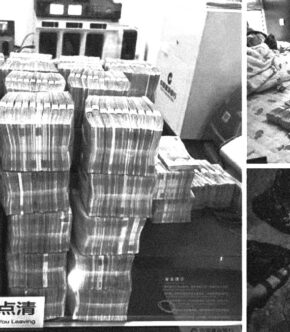China has quietly risen to become the world’s largest money launderer, according to evidence compiled by The Epoch Times and supported by data from U.S. financial investigations. American officials say the scope of Chinese criminal finance has expanded beyond narcotics to encompass nearly every form of global illicit trade. Former U.S. Treasury special agent John Cassara estimates that Chinese networks launder about $2 trillion each year, nearly half of all money laundered worldwide.
Brian Clark, special agent in charge of the DEA’s Los Angeles Field Division, recalls that the shift began nearly a decade ago. His team arrested a Chinese money courier who had been working with the Sinaloa Cartel. The man was identified after meeting with a cartel leader in Mexico and was later detained during a layover in the United States. After his arrest, the courier cooperated with law enforcement and revealed how the Chinese money laundering machine functioned.
“By 2015 and 2016, Chinese money laundering organizations started appearing on our radar,” Clark said. “By 2019, they dominated the marketplace.” He added that these Chinese groups offered cartels “cheap, fast, and almost guaranteed” services. Their commissions were so low that they undercut traditional launderers and drove out competitors. “They charged close to zero percent for several years,” Clark explained, compared to the 10 to 15 percent typical in Latin America.
Former DEA agent Robert Zachariasiewicz said that this pricing revolution changed the economics of organized crime. “Chinese brokers’ commissions remain between zero and six percent, giving cartels a direct boost in profits,” he told a Washington-based think tank. Former DEA official Christopher Urben told Congress that the shift increased cartel profits by three to five percent, a difference that adds up to billions of dollars annually.
How Beijing’s underground banking system works
At the core of these operations lies an ancient but effective system of “fei qian,” or “flying money.” This underground banking network operates outside the formal financial system and moves money across borders without wire transfers or records.
Cartels in Mexico and South America accumulate mountains of U.S. dollars from drug sales but face strict limits on dollar deposits in local banks. Meanwhile, wealthy Chinese citizens, restricted by Beijing’s annual $50,000 foreign exchange cap, desperately seek U.S. currency to invest in real estate or pay university tuition abroad.
Chinese brokers saw an opportunity. Cartels hand over drug dollars in the United States, and the brokers sell those dollars to Chinese clients who need them. The clients pay an equivalent amount in yuan inside China to cartel-linked accounts. The dollars never leave American soil, and the yuan never leaves China. Clark said, “The wealthy Chinese people’s need for U.S. dollars completely changed the money laundering landscape. It meant the drug money didn’t even need to cross borders anymore.”
These mirror transactions made the flows nearly impossible to detect. As Cassara explained, “It is straightforward. It has nothing to do with ideology. It is right or it is wrong. People know that; it’s in your gut.”
In some cases, launderers use trade-based schemes. A Chinese business might ship $1 million worth of electronics to a cartel-linked importer in Mexico but issue an invoice for only $10,000. When the goods are sold, the cartel’s “profit” of $990,000 is effectively clean. Global Financial Integrity, a U.S. research group, found that the total “value gap” in trade data between developing and developed nations reached $835 billion in 2018, with China responsible for 37 percent—five times higher than the next country.
How it fuels drugs, corruption, and crime
The damage from this shadow empire is measured not just in dollars, but in lives. Fentanyl and other synthetic opioids, often made with chemical precursors from China, now kill over 100,000 Americans each year. Clark said that Chinese laundering networks “put more money in the hands of cartels, which leads to more drugs, more violence, and more death.”
Experts say that Beijing’s tolerance of these networks is no accident. David M. Luna, executive director of the International Coalition Against Illicit Economies and a former U.S. national security official, told The Epoch Times that “China, directly and indirectly, profits from money laundering operations that touch its economy and financial sector.” He added, “The CCP allows it because it is so lucrative, and it helps China expand the global illegal economy that drives their commercial and geopolitical ambitions.”
Reports from international organizations back this up. The Organisation for Economic Co-operation and Development (OECD) found that countries receiving more Chinese investment also export more counterfeit goods, which are a leading vehicle for money laundering. The trade in fake products alone is worth about $500 billion a year, and China remains the dominant source.
Corruption spreads alongside these financial networks. The Foundation for Defense of Democracies wrote that China’s Belt and Road Initiative targets developing countries “where corruption is already prevalent,” and that Beijing “clearly considers transparency and accountability to be unacceptable risks.”
The United States responds
To combat the growing threat, Washington has taken several aggressive steps. In February, President Donald Trump declared the U.S. narcotics crisis a national emergency and imposed a 10 percent tariff on Chinese goods, citing China’s role in supplying fentanyl precursors and laundering cartel funds. The tariff was later doubled to 20 percent and remains in effect despite Beijing’s protests. The Trump administration also designated eight Latin American cartels as foreign terrorist organizations, allowing the DEA and intelligence agencies to deploy counterterrorism resources against them.
Clark said that while Chinese laundering schemes can be complex, U.S. banks remain a weak link. “Depositing cash is still where we can find them,” he noted. That has led to tighter scrutiny from the Treasury Department’s Financial Crimes Enforcement Network (FinCEN), which reported that Chinese launderers moved $312 billion through American banks between 2020 and 2024.
In one major case, a Chinese network pleaded guilty to laundering $92 million in drug proceeds. Another case in Los Angeles involves 11 Chinese nationals accused of laundering $50 million for the Sinaloa Cartel.
FinCEN’s new guidance warns banks to flag red indicators such as unexplained wealth among Chinese nationals with student or laborer visas, or all-cash real estate purchases. “Money laundering networks linked to passport holders from the People’s Republic of China enable cartels to poison Americans with fentanyl, conduct human trafficking, and wreak havoc among communities across our great nation,” said John K. Hurley, Under Secretary for Terrorism and Financial Intelligence. “The United States will not stand by and allow nefarious actors to launder illicit proceeds through our financial system.”
Laundering through real estate and the banks
Beyond narcotics, Chinese laundering operations have infiltrated the U.S. real estate and banking sectors. According to ACZ’s reporting, roughly $54 billion in suspect property transactions over the past five years were tied to Chinese-origin funds. Banks handled another $246 billion, and securities firms processed $23 billion. TD Bank paid more than $3 billion in penalties after investigators discovered $470 million laundered through its branches by Chinese brokers operating in New York and New Jersey.
Cassara and other experts have warned Congress that the scale of the activity dwarfs the attention it receives. Despite public focus on cryptocurrency, he noted that “illicit crypto transactions total less than $200 billion worldwide,” a fraction of the trillions funneled through traditional banking channels.
The “CCP Inc.” system
Cassara describes this global laundering web as “CCP Inc.,” a hybrid of state control and criminal enterprise. He argues that confronting it could be one of America’s most effective strategies against Beijing’s influence. “China, CCP Inc., is vulnerable when we’re talking about transnational crime and money laundering,” he said. “If we really focused on this area, it would be extremely effective—and it needs to be done.”
Luna agreed that Chinese illicit networks act as “a threat multiplier,” driving instability and violence around the world. He added that anti-money-laundering efforts should be a central part of America’s foreign policy, especially as Beijing prepares to host the 2026 APEC summit.
While China recently amended its anti-money-laundering laws to include non-financial businesses like real estate, U.S. officials remain skeptical. The State Department concluded that “serious implementation shortcomings persist” and cited “insufficient cooperation with U.S. law enforcement.”
A black hole in the global economy
A senior Treasury official described China’s shadow banking network succinctly: “Fei qian is a black hole in the global economy. Money goes in, but it doesn’t come out in any traceable form.”
As long as these networks thrive, experts warn, billions in dirty money will continue to circulate through the legitimate financial system—fueling drug addiction, corruption, and political leverage for the Chinese Communist Party.
The fight against what Cassara calls “the largest money laundering actor in the world” is no longer just about drugs or financial crime. It has become a front line in the broader struggle between transparency and authoritarian power, between accountability and a regime that profits from the shadows.





